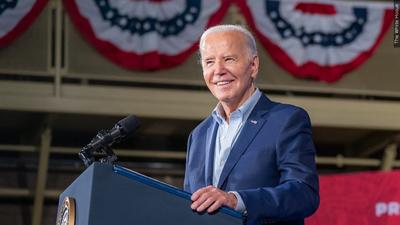
Washington (CNN) — President Joe Biden continues to cement his political legacy during his final months in office, marking the 30th anniversary of the Violence Against Women Act at the White House on Thursday.
Highlighting the landmark legislation he shepherded as a US senator, the president will host nearly 1,000 survivors, advocates, former staffers and allies at an event celebrating the legislation on the South Lawn of the White House. The Biden administration also is rolling out new measures to combat gender-based violence to coincide with the legislation’s anniversary, administration officials said.
In an op-ed publishing Thursday, the president hailed the “tremendous progress” made thanks to the legislation over the past 30 years and emphasized how the measure eased the stigma around domestic violence.
“Back then, society largely turned a blind eye, dismissed cries for help, or blamed the victims. It was wrong,” Biden wrote in the op-ed Thursday. “I have long believed that ending violence against women requires a wholesale cultural change – one that brought this hidden epidemic out from the shadows.”
The push comes as Biden has entered a distinct phase of his presidency after he abandoned his bid for a second term in the White House. While much of the spotlight is on the candidates on the campaign trail, the president is looking for ways to reinforce key legacy items from his time in office on foreign and domestic fronts.
The Violence Against Women Act, which Biden helped write and first introduced in 1990, is among the most personally significant measures he has helmed in his five-decades-long political career. The president has long called it his proudest legislative accomplishment as it extended historic protections and support to survivors of domestic violence and sexual assault for the first time.
“He made it happen, and he took it out of the shadows,” said former Sen. Barbara Boxer, who worked with Biden on the legislation in the early 1990s. “In those years, violence against women, especially in marriages and relationships, was the best kept secret. A woman would show up with a bruise on her face. She would never say her husband did it. It was hardly considered a crime.”
“Joe was irate about that,” Boxer recounted in an interview with CNN. “He said, ‘There’s no such thing as, quote-unquote domestic violence. It’s just violence. And we have to bring this issue out.’”
Biden announcing new measures to take on domestic violence
The president will again put the spotlight on the issue on Thursday as he hosts an event ahead of the Friday anniversary of the law’s signing. Survivors are expected to share personal testimonials to stress why the protections put in place by VAWA are critical to those who have experienced abuse.
The new Biden administration efforts rolling out Thursday include the Justice Department announcing $690 million in grant funding to support survivors of gender-based violence and the creation of the Office on Gender-Based Violence at the Department of Housing and Urban Development to address housing issues facing survivors.
The Justice Department is also announcing funding for the National Resource Center on Cybercrimes Against Individuals to help combat “cyberstalking, the non-consensual distribution of intimate images, and other forms of technology-facilitated abuse,” according to the White House. The administration is also announcing voluntary commitments from technology companies to combat the creation of image-based sexual abuse, including content developed using artificial intelligence.
“The conversation is now about: How do we evolve? How do we meet the next threat?” said Deputy Attorney General Lisa Monaco, who previously worked for Biden on the Senate Judiciary Committee. “We are building now on a history and a legacy from the president’s work in really starting this conversation, pushing this legislation, pushing this change.”
Changing the conversation around domestic abuse
Biden first introduced the Violence Against Women Act in 1990 as he looked to provide protections to survivors and change the conversation around the issue of domestic abuse.
“The bill has three broad, but simple, goals: to make streets safer for women; to make homes safer for women; and to protect women’s civil rights,” Biden said at a Senate hearing in 1990.
As chair of the Senate Judiciary Committee, Biden held some of the first major hearings on domestic violence, which included female witnesses recounting their personal harrowing experiences with violent acts. As they looked to raise awareness about the issue, judiciary committee staff read letters from women who experienced violence from their partners and called battered women’s shelters and police departments to gather data and hear personal stories of reports of violence against women.
“It was really about trying to change attitudes and raise awareness to change the conversation about this problem,” said Monaco, who was a young staffer at the time. “It was about really shining a light on a problem, on an injustice, and showing what the law wasn’t addressing and why it needed to change.”
Boxer worked closely with Biden on the legislation while she served in the House and later in the Senate. In an interview with CNN, she recounted a moment where Biden joined a group of female lawmakers to discuss the bill but had the women take the lead.
“What Joe Biden showed in those years is how much he respected women and how much he wanted to push us forward,” Boxer said. “He had such a feeling in his heart that he wanted the women to step out, and he didn’t want to step on us. He wanted to work with us.”
Biden later moved to include VAWA as part of the Violent Crime Control and Law Enforcement Act, which President Bill Clinton signed into law in 1994. The sweeping crime bill included an assault weapons ban and put 100,000 new police officers on the streets. But it also set harsher sentencing laws and provided incentives for states to implement mandatory minimum standards – components many now argue contributed to an era of mass incarceration.
But the VAWA provisions transformed protections and support offered to survivors of domestic violence, sexual assault and stalking. It created the National Domestic Violence Hotline, which has fielded more than 7 million calls since 1996. The law provided grants to support rape crisis centers, women’s shelters and programs aiding survivors while also boosting initiatives to train law enforcement, advocates, prosecutors and judges about gender-based violence.
Combatting an ‘abuse of power’
With each reauthorization of the bill, Biden and proponents of the measure have worked to expand its coverage to include those who have endured dating violence and individuals of any sexual orientation or gender identity, as well as increase support services for immigrants and communities of color.
The legislation, which needs reauthorization every five years, has experienced some battles on Capitol Hill. The bill expired in 2019 under former President Donald Trump, making it a key priority for Biden to push forward when he entered the White House.
“He was really focused on making sure that it actually did get reauthorized, that we did it with bipartisan support,” said Jennifer Klein, director of the Gender Policy Council at the White House. “And that we did what had been done three times before which was to make sure that the law not only was strengthened, expanded but also took on whatever issues had arisen.”
In 2022, the law was reauthorized and included new protections for LGBTQ+ survivors and individuals in tribal communities and rural areas. It also established new protections to address online harassment and abuse. Efforts to close the so-called “boyfriend loophole” as part of the reauthorization were dropped and later included in a bipartisan gun safety bill passed later that year.
The president has long said his commitment to addressing violence against women has been rooted in the values instilled by his family.
“My dad would say the greatest sin of all that anyone could commit was the abuse of power, and the cardinal sin was for a man to raise his hand to a woman or a child. That’s what this law has always been about: the abuse of power,” Biden said in 2022.


















